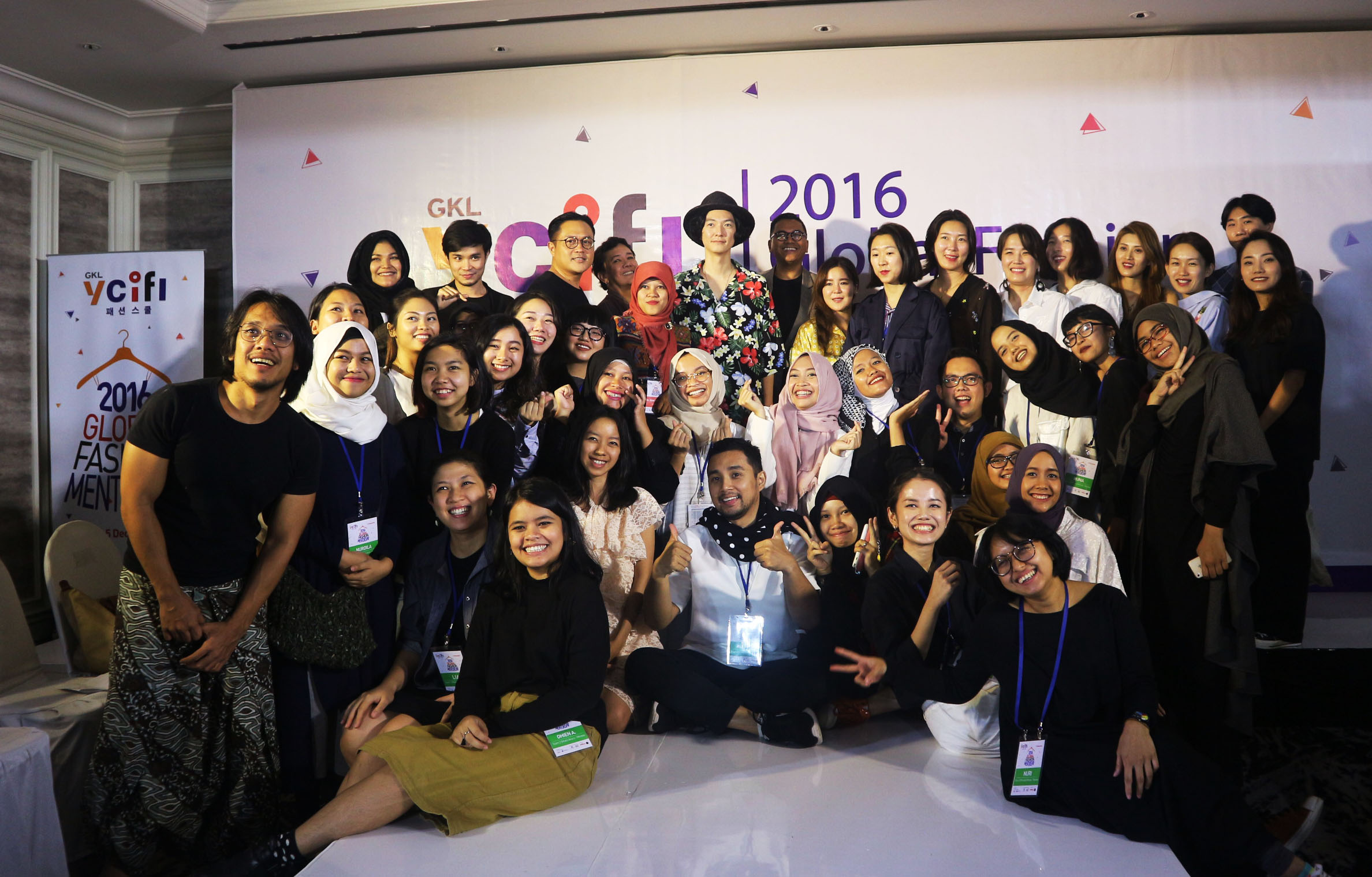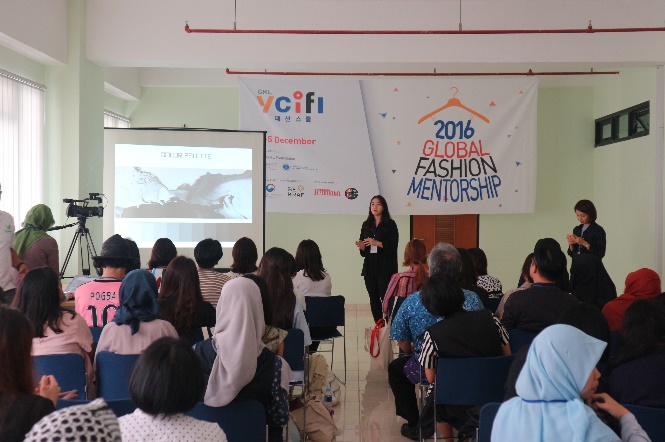| Title | A Training Project in Indonesia for New Designers Targeting the Global Fashion Market – 2016 Global Fashion Mentorship | ||||
|---|---|---|---|---|---|
| No | 102 | Inquiry | 1920 | Date | 2016/12/05 |
Could fashion from the Korean wave serve as a role model in making strides in the global fashion market? <Global Fashion Mentorship>, a project in which Korean fashion experts support Indonesian fashion talent of the next generation to enter the global market, was held for five days from December 1st to 5th at Bandung, the center of the Indonesian fashion industry.

All participants of the <Global Fashion Mentorship> project who have gathered on the runaway
For a long time, Indonesia has been playing the role of a production base for the global textile and clothing industry. Recently, as there have been increase in GDP and acceleration of the global market opening, interests related to “style” and “fashion” have greatly risen in the country. Now, Indonesia has become the center of fashion consumption in Asia. The Indonesian government even adopted fashion as a key tool to spur the growth of the nation’s creative economy, and selected Korea as a role model for its experience in developing its own fashion industry. Fashion has become a keyword in the context of exchange and cooperation between Korean and Indonesia, as well as their mutual growth.

Mentees who, after taking mentoring class, are presenting a project proposal for their brand
The Korean Foundation for International Culture Exchange took into account the two nations’ interest in regard to the growth of the fashion industry, improving exchange between the two nations, and practical industrial demand. Therefore, it established a fashion education center, targeted toward training human resources for fashion in Indonesia. Since last October, it has been running GKL-Young Creator Indonesia, which manages the professional education program and discovers new talent for the fashion industry. To provide practical experience and know-how needed to successfully enter the global fashion industry, it started <Global Fashion Mentorship>, in which Korean fashion experts are invited to give intensive training.
Korean experts who are active in global fashion, including top designer Hong Hye-jin and Kwon Moon-soo, chief editor of W Magazine Choi Yoo-gyung, creative director of DCG Jeon Hyo-jin, and managing MD of WizWid Cho Ah-young, recognized the significance of this business and decided to participate. After being appointed “global fashion mentors” by the ministers of Korea and Indonesia, they spent two months in preparation. Along with 13 other people who each have their own area of expertise in the fashion industry, they were all sent to Bandung.
35 individuals were selected from the YCIFI fashion education center and ESMOD Jakarta Fashion School as the mentees for this mentorship program, and were grouped into 8 teams. The program offered each team an opportunity to launch a new brand. The teams were tasked with accomplishing all the procedures necessary for starting up and succeeding with a fashion business, including planning, producing clothes, and setting up marketing strategies. Sometimes, mentees complained of the stress due to the tight time constraint. However, after receiving lessons from Korean mentors—professionals with actual experience in the global arena—in the principles of design and strategies for sales promotion, they were able to apply and build upon what they learned and achieve good performance, creating a high-quality product.
After two days of intensive mentoring driven by the mentors' devotion and mentees' passion, 8 new fashion brands were launched and a cool fashion show was held. In this fashion show, which was carried forward by the collaboration between Jakarta Fashion Week and Korean experts on fashion show planning, the final products of all their efforts were presented: 24 clothes from 8 brands. Thus, all mentees were able to experience participating in a fashion show and produce some results, including a new fashion portfolio, video, and lookbook. Furthermore, the top 3 teams that were selected through the final evaluation were provided a fashion photo book, which was professionally made by fashion models and photographers. The top team, Meraki, will also get an opportunity to enter Jakarta Fashion Week if their brand proves to be competent. From the mentorship program, the mentees have secured fashion career experience and skills, which in turn can contribute to their entrance into Indonesia's main fashion industry.
A scene from a fashion show demonstrated by 8 new brand teams
The visit by their Korean fashion mentors and the delegation itself has brought about a lot of attention from the Indonesian fashion industry and local government.
In this mentorship program, 6 additional fashion experts in different fields had also participated, including Indonesian top designer Aguste Soesasto. Through collaboration with Jakarta Fashion Week, a media meeting was held by FEMINA, Indonesia's major fashion media group, contributing to the popularity of Korean fashion. There was also meaningful exchange between experts on the fashion culture industry from both Korea and Indonesia as they interacted and communicated with one another.
The potential arose for a joint business with its base in Bandung, the center of the Indonesian fashion industry. After perceiving the significance of exchange and cooperation in business with Korea for training creative human resources and promoting the fashion culture industry, Bandung mayor Ridwan Kamil and vice-president of Bandung Creative City Forum Tita proposed a plan to employ the first Creative Center in Indonesia, which is to be built next year, for our business. These opportunities will lead to more opportunities—and next year, we can establish a virtuous cycle of education for fashion human resources and their entrance into the fashion industry.
<2016 Global Fashion Mentorship> was carried out to organize and send a young cultural delegation for fashion, who can professionally and succinctly share creative development experience in the Korean fashion industry and thereby discover and train talents for the Indonesian fashion industry. The mentorship was also done for the purpose of offering a site for mutual exchange between core figures of the fashion industry from Korean and Indonesia, constructing an interactive network that can lead to mutual growth in the global fashion industry. Will this be the starting point from which Korea expands its national image and extends the influence of Hallyu fashion in Indonesia, the base of the new fashion consumption market? Time will tell.
- ▲ Prevtest
- ▼ NextThe 6th 'Hanllyu Now' Seminar

